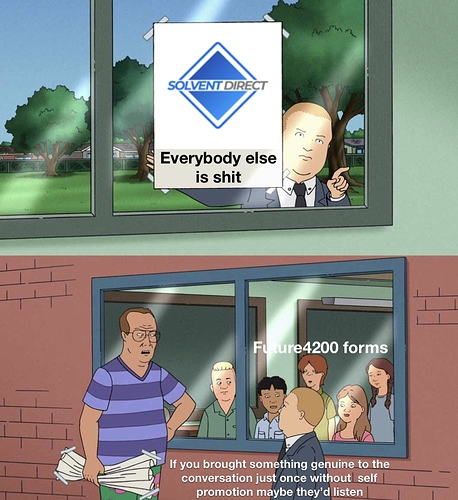Dude I have messages about this same topic contradictory to your claims. From your customers. Do you need me to post it again.
cue Godzilla music ![]()
![]()
For the record cannaquantum did imply that they had some unlisenced product for sale, prob why they got the ban hammer.
Anyway, back to the solvent direct shitstorm… Got my ![]()
![]()
That solvent compatibility chart seems… Odd. Who is it from? Very surprised to see so many A’s for plastics and C’s for 300 series stainless.
Could there be some @tom_foolery going on here…?
Kbbq is worth a lot
Thanks @Dirteagle.
Who is enforcing adultered product regulations?
Are home heating and welding gases not industrial gases?
We were talking about 3 Phase Cylinder Decontamination cleanings, not re-qualifications.
Everytime you remove the valve you gotta do a requalification VTI.
I’ve seen C’s for high carbon stainless steel in pentane in some charts. Had a debate over it in a thread here somewhere. The consensus was that it may possibly warp or get impregnated or something so bearings or other moving parts may get damaged. Prob nothing to worry about regarding utensils, trays etc
Hi @Dirteagle,
We’ve spent time researching your claims with our QA and Compliance Teams and just want to clarify some of your statements to ensure the forum members have accurate information:
You are wrong about the requirements of removing a valve. You should brush up on 49 CFR § 173.301(a)(2).
Solvent Direct has qualified technicians performing all of our work. We have Tank Inspectors and Certified Hazmat Handlers that carry out different functions.
Certified Hazmat Handlers and Certified Tank Inspectors perform our 3 Phase Decontamination Cleanings before EVERY refill and they perform multiple visual tank inspections during this process.
3 Phase Decontamination Cleanings occur much more often than once a year. At Solvent Direct these certifications occur before every refill which is typically completed a couple of times per month.
Our Certified Hazmat Handlers and Certified Tank Inspectors sign off on the completion of their visual inspections on our Certificate of Decontamination and Visual Inspections before EVERY refill.
Qualified Technicians complete separate visual inspections once per year required by law.
Qualified Technicians complete the re-qualifications every 5/10 years of every cylinder.
We have a completely different division that handles our Hydrostatic Testing and Ultrasonic Examinations every 5/10 years.
For the record, the only time a Certified Tank Inspector is required for a visual tank inspection more than once per year is IF there is damage per 49 CFR § 173.301(a)(2), which states:
"If any of the defects noted in items 1 through 4 below are present, the cylinder must not be filled and may only be repaired, requalified, or rebuilt by an authorized U.S. DOT facility (see authorized RIN and VIN holders below):
- Damage to the cylinder’s exterior including dents; bulges; cuts; or cracks on the cylinder’s surface, or to welds; and any evidence of physical abuse; fire; or heat damage.
- Detrimental rust, corrosion, or pitting on the cylinder, particularly on the bottom.
- Absence of/damage to a cylinder footring, cylinder neckring (collar), or valve cover.
- A leaking or defective valve or leaking or defective pressure relief device.
A cylinder conforming to the Visual Inspection criteria also must be examined for the most recent repair, requalification, or rebuild date prior to filling. Cylinders that are overdue for requalification must NOT be refilled."
It sounds like you have the best intentions and some cylinder experience, but if you’re confused by what we’re doing to ensure purity it’s because no one else does what we do.
1-833-Pure-Gas
Thank you for clarifying your process. ![]()
Sidebar: if cylinders come back empty, there’s no way of knowing if the valve is properly working, thereby triggering clause 4 and the requirement for a requalification VTI.
Ours come back under pressure.
Define empty.
Hope both of you have an excellent Friday! ![]()
Great point Killa! Need to get back to routing our trucks so we can wrap up our weekend delivery schedule. Let us know if you need anything!
Let’s conclude today’s lesson for @Dirteagle’s big ideas with a definition of “empty” cylinder per DOT law.
It’s not empty if it’s under pressure per DOT law.
In 7 years selling hydrocarbon gas, we’ve never seen a single customer return a cylinder completely empty and not under pressure.
We can verify valve integrity because they are under pressure no matter how much gas is contained within the cylinder.
Happy Friday Fam!
Agreed. Unfortunately I cant say the same for the SCUBA industry. We get empty tanks in all the time from third parties.
The scuba people must be emptying them on purpose then because as a diver…: you are taught to reserve part of your tank.
I’ve never taken a rental tank back to the dive shop ever empty
Yeah… people are great.
Quick question, not to get this going again, but if gas did have chlorine in it how much would it effect the psi in the recovery tank? Might be a dumb question but ever since i got gas that had a very very obvious chlorine smell my psi has been alot higher than usual or what i would like it to be.

